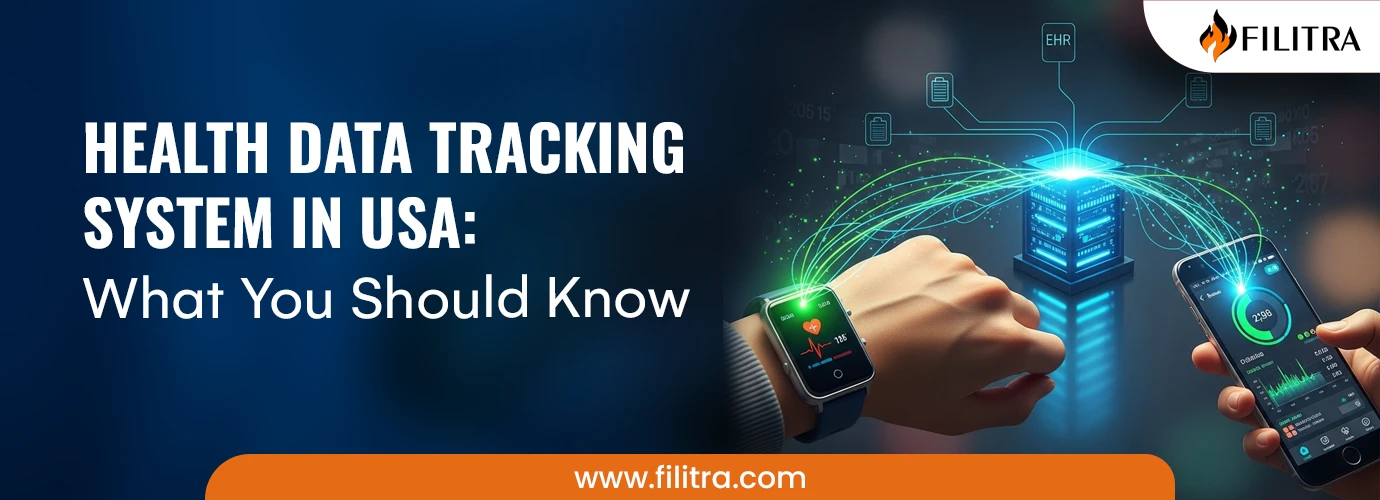Key Takeaways:
- Health tracking systems include EHRs, wearables, and mobile apps.
- Benefits include better diagnosis, reduced errors, and patient empowerment.
- Challenges include privacy risks and data overload.
- Tools like Filitra can be monitored more effectively with data insights.
- Government initiatives and AI will continue to expand this space.
In today's digital age, your health is no longer just in the hands of your doctor — it's also in the data. Health data tracking systems in the USA are changing the way healthcare is delivered, making it faster, more personalized, and more efficient than ever before. But what exactly are these systems, and how do they impact you?
Let’s break it down.
What Is a Health Data Tracking System?
A health data tracking system is a digital platform that collects, stores, and analyzes a person’s health-related data. This includes everything from your vital signs and lab reports to prescriptions, exercise routines, and even sleep patterns. These systems help both patients and healthcare providers make better decisions by giving real-time access to accurate medical information.
The U.S. government and private companies have invested heavily in health IT, with systems like:
- Electronic Health Records (EHRs)
- Personal Health Records (PHRs)
- Wearable health tech platforms (like Fitbit, Apple Health, Garmin)
- Government programs like Blue Button and MyHealthEData
Why Is Health Data Tracking Important?
Here’s why these systems matter:
- Better Diagnosis: Doctors can detect health issues early when they have access to ongoing data.
- Fewer Errors: Medication history and allergies are recorded to prevent mistakes.
- Improved Outcomes: Chronic conditions like diabetes or hypertension are easier to manage.
- Patient Empowerment: People are more involved in their health decisions when they track data.
In a country where chronic diseases account for nearly 90% of healthcare spending, tracking tools are essential.
Types of Health Data Tracked
Health tracking systems collect a wide range of information. Here are some common types:
Medical History
Diagnoses, surgeries, allergies, immunizations
Vitals and Biometrics
Blood pressure, heart rate, oxygen levels, glucose
Lifestyle Data
Exercise habits, diet, alcohol use, smoking, stress
Medication Use
Prescription refills, dose adherence, drug interactions
Mental Health
Mood tracking, therapy records, behavioral patterns
Sexual & Reproductive Health
Cycle tracking, ED symptoms, contraception data
This extensive range of information allows healthcare systems to take a holistic view of a person’s well-being.
Government Initiatives Supporting Health Tracking in the USA
The U.S. government supports digital health initiatives in several ways:
- Blue Button Initiative
This allows Medicare beneficiaries to download and share their health records securely. Private insurers have also adopted similar services.
- MyHealthEData
Launched by CMS (Centers for Medicare & Medicaid Services), this program gives Americans access to their own electronic health data.
- HIPAA Compliance
The Health Insurance Portability and Accountability Act ensures that your personal health information is secure and cannot be shared without your consent.
Popular Health Tracking Platforms in the USA
Several platforms and tools make it easier for Americans to track their health daily:
- Apple Health and HealthKit – Integrates with iPhones and Apple Watches.
- Google Fit – Android users can log activity, vitals, and connect devices.
- MyFitnessPal – Great for calorie, weight, and fitness tracking.
- Fitbit – Monitors heart rate, steps, sleep quality, and exercise.
- Patient Portals (Epic, Cerner, Allscripts) – Used by hospitals to manage patient data.
These platforms often sync with each other, giving users a centralized view of their health.
Health Data Tracking and Erectile Dysfunction (ED)
Data tracking isn't just about weight loss or fitness — it’s also transforming how men manage sensitive issues like erectile dysfunction (ED).
For example:
- Medication Monitoring: Track timing and effects of ED drugs like Filitra (Vardenafil).
- Performance Logs: Apps help men record erection quality and timing over time.
- Lifestyle Tracking: Monitor triggers such as stress, alcohol, or lack of sleep.
- Sexual Health Journals: Keep notes on frequency, satisfaction, and any side effects.
When users track these metrics, it helps doctors tailor ED treatments — including dosage adjustments, therapy recommendations, or lifestyle changes.
Benefits of Health Data Tracking for Healthcare Providers
Physicians and medical teams benefit in several ways:
- Faster Decisions: Clinicians can access test results and history instantly.
- Remote Monitoring: Helps doctors manage patients from a distance.
- Predictive Insights: AI can alert providers to early warning signs.
- Coordinated Care: Specialists across different locations can collaborate.
These systems also reduce paperwork, improve billing accuracy, and ensure better compliance with treatment plans.
Risks and Challenges of Health Tracking Systems
While health data tracking is revolutionary, it's not without challenges:
- Data Privacy Concerns
Even with HIPAA, breaches can happen. In 2023, over 100 million patient records were exposed through cyberattacks.
- Overreliance on Technology
Not all devices give accurate readings. Misinterpretation of data could lead to anxiety or improper treatment.
- Digital Divide
Older adults, low-income groups, or rural populations may lack access to smartphones or internet.
- Data Fatigue
Too much tracking can overwhelm users, leading them to abandon the tools altogether.
Despite these concerns, awareness and regulation continue to evolve to protect users.
Future of Health Data Tracking in the USA
The next decade will bring major advancements:
- AI-Powered Diagnostics: Tools will suggest actions based on data trends.
- Genetic Integration: DNA data will help personalize treatment.
- Voice and Emotion Tracking: Wearables may detect stress from voice tone.
- More Interoperability: Systems will communicate better across apps and providers.
- Blockchain for Data Security: A tamper-proof way to store health data.
These innovations aim to make healthcare smarter and more preventive.
Tips for Using Health Tracking Systems Wisely
Want to take charge of your health using tracking tools? Here’s how:
- Start Simple – Choose 1 or 2 metrics (e.g., steps, blood pressure).
- Be Consistent – Daily or weekly tracking works better than random check-ins.
- Review the Data – Check progress and trends monthly.
- Share with Your Doctor – Bring your app data during appointments.
- Keep It Private – Use encrypted apps and change passwords regularly.
Remember, technology is a tool, not a replacement for real medical advice.
Final Thoughts
The health data tracking system in the USA is one of the most exciting shifts in modern medicine. It empowers patients, supports doctors, and helps prevent disease before it starts. Whether you're managing chronic illness, improving your fitness, or monitoring sexual health with medications like Filitra, digital tracking plays a powerful role.
The future of healthcare is digital, personal, and data-driven. And it's already here.
Related Blog Posts:
What Is the Best Natural Drink for Erectile Dysfunction?
What is the main cause of Erectile Dysfunction?
The Root Causes of Erectile Dysfunction
What causes erectile dysfunction?
Over the past 10 years, I’ve dedicated my research and writing career to improving men’s sexual health. From reviewing ED drug formulations to analyzing clinical outcomes, I focus on delivering trusted insights that support patient safety and long-term results.








